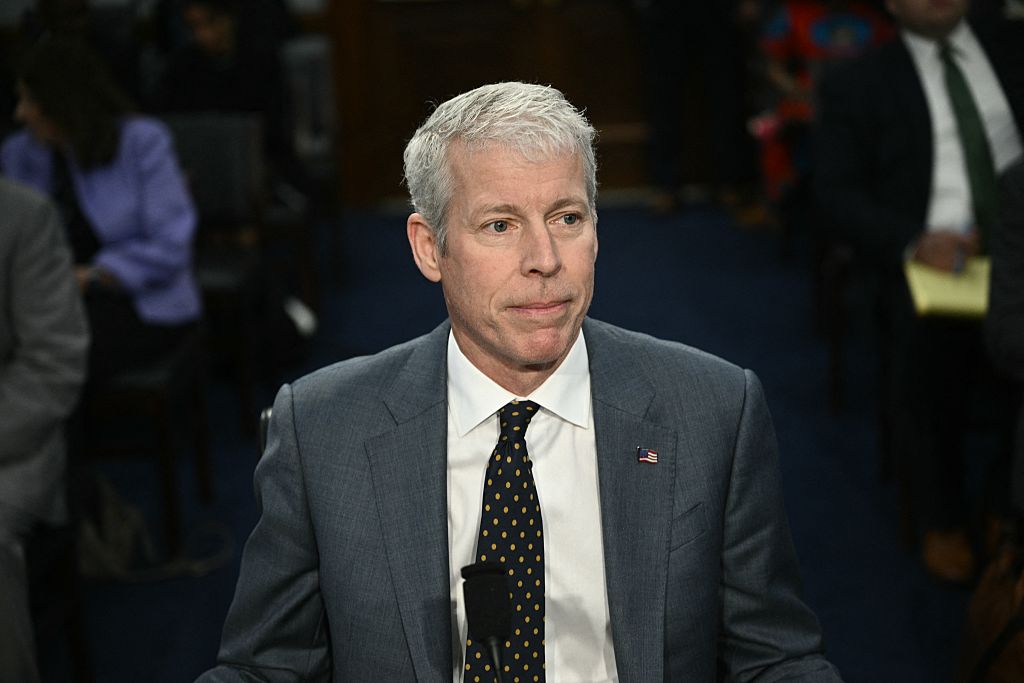House panels gets first glimpse of Department of Energy’s $45 billion spending request, which is nearly 10-percent less than this year’s enacted budget.
The Trump administration’s proposed 2026 Department of Energy $45.1 billion budget guts $19.3 billion in dedicated funding for Biden-era “green energy” initiatives, including slashing three-quarters of approved allocations for energy efficiency and renewable energy programs.
Overall, the Department of Energy’s (DOE) Fiscal Year 2026 spending request is 9.4 percent less than this year’s $52 billion budget, but increases funding for the National Nuclear Security Administration, which develops and maintains the nation’s nuclear weapons arsenal, by 25 percent.
Without that bump, the remainder of the proposed DOE budget trims spending by 18.2 percent, cutting $15.2 billion in allocations from the 2021 Bipartisan Infrastructure Law, $2.6 billion from its Office of Energy Efficiency and Renewable Energy, $1.1 billion from its Office of Science, and $389 million from its Office of Environmental Management.
The House Energy Committee’s Energy and Water Development Subcommittee got its first glimpse of the tentative plan during a 135-minute May 7 hearing.
Energy Secretary Chris Wright cautioned further changes are likely with the Trump administration ferreting through tentative “skinny budgets” to find more than $163 billion in cuts.
“President Trump is committed to balancing the budget and implementing fiscal restraint, focusing agency funding on the crucial goal of unleashing American energy dominance,” Subcommittee Chair Rep. Chuck Fleischmann (R-Tenn.) said.
“This is a commitment I share and a duty I intend to fulfill.”
Fleischmann said the administration’s budget refocuses policy on production rather than mitigating climate-related impacts, and gears resources into expanding the nation’s electrical grid to accommodate increasing demand spurred by data center development, artificial intelligence computing, and bitcoin “mining.”
Fleischmann praised the administration for ending Biden’s pause on liquified natural gas exports, for its deregulatory actions, and for opening federal lands and waters to more fossil fuel development.
Fleischmann also said lawmakers “still are awaiting the full details of the president’s fiscal 2026 budget request.”
Among issues with the plan that alarm him is the proposed $1.1 billion trim in DOE’s Office of Science budget.
“I’m concerned to see such a significant reduction,” Fleischmann said, noting the office coordinates research among DOE’s 17 national laboratories that “is essential to rebuilding our domestic critical minerals production capacity, expanding American energy production, enhancing our national security, and competing with our adversaries like Russia and China.”
Fleishmann, a longtime nuclear energy advocate who authored an April 28 Washington Times editorial promoting nuclear development, said he also has concerns with nearly half the discretionary funding for nuclear reactor development, researching advanced nuclear fuels, and maintaining the Idaho National Laboratory cut from the budget.
The administration’s proposed $408 million FY26 Office of Nuclear Energy budget is nearly $360 million less than this year’s allocation.
“We’re at a pivotal moment in the development of our nuclear energy technologies in the United States, the success of which are critical to regaining international dominance in the nuclear market for our own domestic energy security,” Fleischmann said.
He was, however, “pleased” with the proposed spending plan’s intent to “prioritize research in high-performance computing, AI, quantum fusion and critical minerals, as well as reprocessing.”

Subcommittee ranking member Rep. Marcy Kaptur (D-Ohio) said the administration’s proposed $20 billion slash in Bipartisan Infrastructure Law renewable energy programs is penny-wise but pound-foolish, saying the “devastating 74-percent cut in energy efficiency and renewable energy is not just short-sighted, it is dangerous.”
Kaptur said rather than using the DOE as “the engine room of our nation’s energy security,” the Trump administration is destroying the department just when it is needed most through “radical cutbacks.”
Since January, she said, the DOE under the Trump administration “has suspended critical energy programs, canceled executed awards and contracts authorized by this Congress, severely reduced staffing, including removal of the inspector general.”
The “resulting confusion,” Kaptur said, “has disrupted communities, businesses, and project developers across our country.”
The proposed budget does not reflect the all-of-the-above energy policy that supposedly enjoys bipartisan support, she said, noting renewable energies are not just gaining in market share, but providing the technical pathways to technologies that will define the future.
“Weakening U.S. energy progress at DOE is a direct threat to America’s energy security and gives our enemies relief,” Kaptur said.
She asked Wright how many employees DOE has and how many have left since the Trump administration assumed office in January.
There are “a little less than 16,000 employees” at the DOE right now, Wright said, down from “a little more than 16,000 employees” when he was confirmed by the Senate in January.
He said the payroll has not been significantly scaled back, but it will be in the coming months in a “slow, deliberative, thoughtful way,” with most departures orchestrated in “a financially kind-as-possible way to [urge them] to move onto the next chapter in their career.”
Wright said DOE’s staffing and budget are bloated, noting its payroll and spending grew by 20 percent under the Biden administration while “energy prices rose and output didn’t.”
A “leaner, more focused team can deliver better results,” he said.
Wright said in his testimony that DOE’s non-military nuclear energy development policies will “prioritize research that supports true technological breakthroughs, such as nuclear fusion, high-performance computing, quantum computing, and AI, which will maintain America’s global competitiveness.”
Boosting the electricity grid is not just key for economic competitiveness, it’s a necessity for national defense, he said.
“AI is the next Manhattan Project. AI technology will define the future of the world, and it is essential that the United States leads in the development of this technology,” Wright said.
“DOE has a significant role to play in driving AI innovation for scientific discovery, energy innovation, and national security.”

